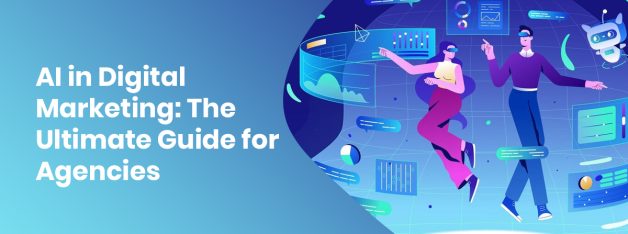AI in Digital Marketing: The concise guide

Artificial Intelligence (AI) is transforming digital marketing, enabling businesses to deliver personalized experiences, automate processes, and make data-driven decisions. This guide explores how AI is reshaping the industry, the latest trends, and key statistics that highlight its impact.
What is AI in Digital Marketing?
AI simulates human intelligence in machines, allowing them to learn, analyze, and make decisions. In digital marketing, AI processes vast amounts of data to optimize campaigns, personalize customer interactions, and improve ROI. It’s a game-changer for marketers looking to stay competitive in a fast-paced digital world.
Key Applications of AI in Digital Marketing
1. Personalization
AI analyzes user behavior and preferences to deliver tailored content, product recommendations, and offers. This enhances customer engagement and drives conversions.
- Statistic: 80% of consumers are more likely to purchase from brands that offer personalized experiences (Epsilon).
2. Chatbots and Virtual Assistants
AI-powered chatbots provide instant customer support, answer queries, and guide users through the buyer’s journey. They reduce response times and improve customer satisfaction.
- Statistic: By 2024, chatbots will save businesses over $8 billion annually (Juniper Research).
3. Predictive Analytics
AI uses historical data to predict future trends, customer behavior, and campaign performance. This helps marketers optimize strategies and allocate resources effectively.
- Statistic: 44% of marketers use AI for predictive analytics to improve customer targeting (Salesforce).
4. Programmatic Advertising
AI automates ad buying and placement in real-time, ensuring ads reach the right audience at the right time. This maximizes ad spend efficiency.
- Statistic: Programmatic advertising accounts for 88% of all digital display ad spending in the U.S. (eMarketer).
5. Content Creation and Curation
AI tools like GPT-4 and Jasper.ai generate blog posts, social media captions, and video scripts. AI also curates content by analyzing what resonates with your audience.
Trend: AI-generated content is expected to grow exponentially, with tools becoming more sophisticated.
6. Email Marketing
AI optimizes email campaigns by analyzing open rates, click-through rates, and user behavior. It segments audiences, personalizes subject lines, and sends emails at optimal times.
- Statistic: AI-driven email marketing can increase click-through rates by up to 41% (HubSpot).
7. Voice Search Optimization
With the rise of voice assistants like Alexa and Siri, AI helps marketers optimize content for voice search by focusing on natural language and long-tail keywords.
- Statistic: 27% of the global population uses voice search on mobile devices (Google).
Trends in AI-Driven Digital Marketing
1. AI-Powered Visual Search
Visual search allows users to upload images to find similar products or information. Platforms like Pinterest and Google Lens are leveraging AI to enhance this capability.
Trend: Visual search is expected to grow as e-commerce brands integrate it into their platforms.
2. Hyper-Personalization with AI
AI analyzes real-time data to deliver dynamic content, offers, and recommendations, creating individualized customer journeys.
Trend: Brands are investing in AI to enhance personalization across multiple touchpoints.
3. AI in Influencer Marketing
AI tools help brands identify the right influencers by analyzing engagement rates, audience demographics, and content relevance.
Trend: AI is streamlining influencer partnerships, ensuring better ROI for campaigns.
4. Ethical AI and Data Privacy
As AI becomes more prevalent, concerns around data privacy and ethical use are growing. Marketers must ensure transparency and compliance with regulations like GDPR.
Trend: Brands are adopting ethical AI practices to build trust with consumers.
5. AI-Driven Video Marketing
AI is being used to create, edit, and optimize video content. Tools like Synthesia enable marketers to generate videos with AI avatars, reducing production costs.
Trend: Video content is becoming more accessible and scalable with AI.
Statistics Highlighting the Impact of AI in Digital Marketing
61% of marketers say AI is the most critical aspect of their data strategy (Salesforce).
AI can increase business productivity by up to 40% (Accenture).
35% of companies are already using AI in their marketing strategies (Adobe).
AI-powered marketing tools can boost sales by up to 50% (McKinsey).
72% of business leaders believe AI will be the key to business growth in the future (PwC).
Challenges of AI in Digital Marketing
While AI offers immense potential, it’s not without challenges:
- Data Quality: AI relies on high-quality data. Inaccurate or incomplete data can lead to poor decisions.
- Cost: Implementing AI tools can be expensive, especially for small businesses.
- Skill Gap: Many marketers lack the technical expertise to leverage AI effectively.
- Ethical Concerns: Misuse of AI can lead to privacy violations and biased outcomes.
How to Get Started with AI in Digital Marketing
- Identify Your Goals: Determine what you want to achieve with AI—whether it’s improving personalization, automating tasks, or optimizing campaigns.
- Choose the Right Tools: Invest in AI-powered tools like HubSpot, Marketo, or Jasper.ai that align with your needs.
- Train Your Team: Upskill your team to understand and use AI effectively.
- Start Small: Implement AI in one area (e.g., chatbots or email marketing) and scale as you see results.
- Monitor and Optimize: Continuously analyze the performance of AI-driven strategies and make adjustments.
The Future of AI in Digital Marketing
The future of AI in digital marketing is bright. As technology advances, we can expect even more sophisticated tools that enhance creativity, efficiency, and customer experiences. Marketers who embrace AI today will be better positioned to stay ahead of the competition and meet the evolving demands of their audiences.
Conclusion
AI is no longer optional—it’s a necessity for modern digital marketing. From personalization and predictive analytics to chatbots and content creation, AI is reshaping how brands engage with their customers. By staying informed about the latest trends and leveraging AI tools, marketers can unlock new opportunities and drive meaningful results.
Are you ready to embrace AI in your digital marketing strategy? The future is here, and it’s powered by artificial intelligence.
